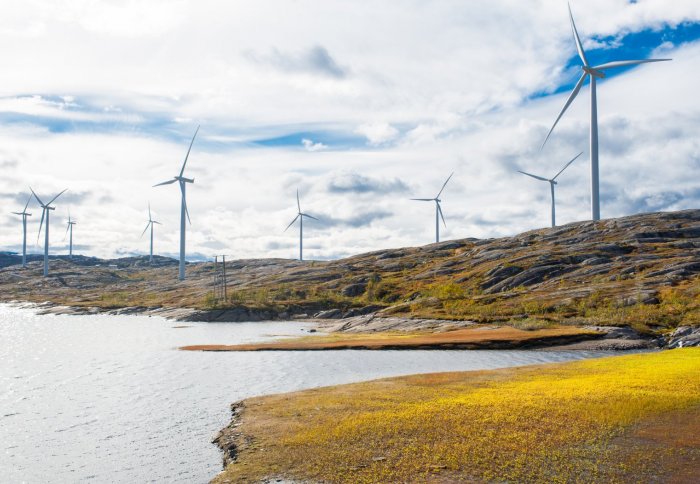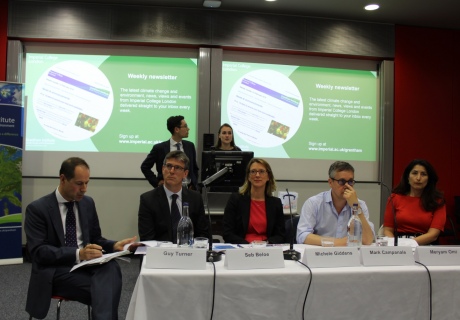Low-carbon tech requires investment, but the payoff is a clean, strong economy

Windfarms across the UK generated more electricity in 2016 than coal power plants for the first time.
Requirements to curb greenhouse gases can challenge some industries, but changes can bring about real financial opportunities, say investment experts.
Experts came together to discuss the financial opportunities in creating a resilient, sustainable, low-carbon economy at a recent event at Imperial College London.
The event, entitled Investment opportunities in a low-carbon economy marked the launch of a Responsible Investment Club at Imperial.
The Club is led by students Nicholas Spooner and Sarah Clements, who are studying the MSc Climate Change, Management and Finance, a programme that the Grantham Institute runs jointly with Imperial College Business School, led by Dr Mirabelle Muuls, Assistant Professor in Economics at the Business School. The event was co-hosted by the Grantham Institute - Climate Change and the Environment.
We are living in perilous times
The event was opened by Professor Martin Siegert, Co-Director of the Grantham Institute, with a panel chaired by Guy Turner who is an energy and climate economist. He began the discussion by saying that we are living in perilous times, referring to the increased risk of climate change impacts.
“The solution has to be to decarbonise,” Mr Turner said. “But how do we get there?”
Speakers on the panel discussed how financial mechanisms can be used to control greenhouse gas emissions; how regulatory, technological and financial drivers can promote investment in low-carbon technologies; and how limiting global warming to the 2°C target set by the Paris Agreement can bring about investment opportunities.
Economy-wide transition
Seb Beloe, Head of Research at WHEB Asset Management highlighted that to shift from economic activities that produce large amounts of greenhouse gases such as carbon dioxide, to what is known as a ‘low-carbon’ economy, investors need to put their money into sustainable, long-term growth.
There are great investment opportunities in resource efficiency technology and sustainable transport, such as in electric vehicles and the massive increase in cycling that has happened in recent years.
– Seb Beloe
Head of Research at WHEB Ventures
“It’s not just about renewable energy. There are great investment opportunities in resource efficiency technology and sustainable transport, such as in electric vehicles and the massive increase in cycling that has happened in recent years,” he said. “There will always be some who never adapt, but by focusing on early-adopters we can create momentum and make change happen quickly.”
Similarly, Michele Giddens, Co-Founder and Partner at Bridges Fund Management, talked about the opportunities she sees in changing to a low-carbon economy.
“We look at the challenges and invest in solutions that also have attractive opportunities for financial return,” she said. Citing former United Nations General Secretary Ban Ki-moon, she emphasised that we are the last generation that can end climate change, and investment is a huge part of that. “What role can we play?” she asked the audience.
Energy markets are facing huge disruption
Mark Campanale, Founder of Carbon Tracker Initiative, suggested that oil and gas companies are betting on an uncertain future by consistently overstating energy demand, underestimating the increasing role of renewables and ignoring looming changes in the energy sector.
He said: “The world is changing. We are already in the middle of huge energy transitions,” he said. “By 2050, solar photovoltaics could supply 29 per cent of global power and electric vehicles over 66 per cent of road transport.”
The Grantham Institute recently published a report that details the disruptive impact of low-carbon technology on energy markets, called Expect the unexpected: The disruptive power of low-carbon technology. In this report, the authors explore the impact of clean technologies on future demand for coal, oil and gas, and why energy companies and their investors need to make a wholesale shift in how they analyse success in the sector.

“Put your money into a future you want to live in”
Similarly, Meryam Omi, Head of Sustainability and Responsible Investment Strategy at Legal & General, highlighted that society is on a dangerous path that could lead to average global temperatures rising by 3-5°C. Although the commitments to the Paris Agreement, cheaper alternatives to high-emission technologies and societal pressure is starting to change the dynamic in investment, everyone needs to do more she said.
“Market regulators need to create an environment in which good management of environmental social and governance factors is valued, and companies need to integrate low carbon opportunities into their culture.”
Ms Omi also emphasised that individuals have to take responsibility on where their money is invested if we are to create a sustainable future. “If you don’t put your money into low-carbon solutions now, they simply won’t develop,” she said. “By tilting our portfolio to be more exposed to opportunities, we can start to change the conversation.”
As part of the ongoing discussion about combatting climate change by transforming investment patterns, the Grantham Institute published a briefing paper on The cost of capital and how it affects climate change mitigation. The paper was authored by Dr Charles Donovan, Director of the Centre for Climate Finance and Investment at the Business School and Dr Christopher Corbishley, Business Coach in Residence.
For more events and news from the Grantham Institute, sign up to the weekly newsletter.
Article supporters
Article text (excluding photos or graphics) © Imperial College London.
Photos and graphics subject to third party copyright used with permission or © Imperial College London.
Reporter
Lottie Butler
The Grantham Institute for Climate Change